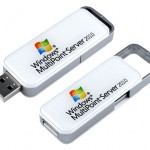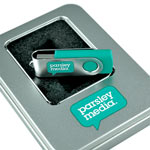If You’re Buying Branded USB Memory Sticks Take 5 Minutes to Read This
Its no exaggeration to say that USB memory sticks are now incredibly popular to the point where they have replaced CD’s and DVD’s as the way to backup personal data and carry it from place to place. Their popularity is driven by their ease of use, their portability and their relatively low cost. Its not uncommon for people to have multiple flash drives with one for work and one for personal data and of course they tend to get replaced/upgraded every year or so to the “latest” model or just a version with more storage capacity.
The growing dominance of the once humble USB memory stick is something the promotion and advertising sector spotted early on. Think about it, its rare to attend a conference, show or seminar and not have been offered at least one promotional memory stick. The reason is understandable – not only are they incredibly popular but they are an excellent way to distributing sales material, links to web sites, media files, presentation slides and lots more besides.
Of course in accepting a branded memory sticks (often pre-loaded with data) you are complicit in the on-going promotion of the “givers” brand beyond the event. It is though a real “win win” for both parties because the giver gets great brand exposure and brand association with a highly regarded product whilst the recipient gets something truly useful rather than a cheap/tacky gift that will be discarded quickly.
But, a word of warning before you rush to buy branded memory sticks; there are a number of important factors that you must consider:
Am I getting A Grade (new not recycled) Memory Chips?
In the world of flash memory chips not all chips are equal and it’s not just the memory size that is the differentiator. Flash memory chips provide the storage capability inside a USB flash drive and these memory chips are graded by the industry. Only “Grade A” flash memory chips are new and provide certified transfer speeds and guarantee access to the full amount of advertised memory on the chip. Other grades are likely to have failed the factory QA process or will have been salvaged from other products. The consequence of using or buying anything other than Grade A chips is likely to be seen in terms of high failure rates, slow/read write speeds and an inability to access or use all of the claimed memory.
Before you order your memory sticks make sure you are getting new Grade A flash memory chips in your memory sticks and choose a supplier you can trust. Its very difficult to spot the use of cheap chips from a visual inspection of the delivered goods. expected and its possible you’ll overpay for what you’re getting. Always check with your supplier that they are using Grade A memory chips
Should I order USB 1.x, USB 2.0 or event the new USB 3.0 and does it matter.
In short make sure you order USB High Speed version 2.0 memory sticks. Anything using USB 1.1 is old and slow and whilst version 3.0 might be tempting because its new you’ll pay a huge premium for USB 3.0 and its not necessary. Whilst you might get USB 1x versions at a bargain price anyone you give them to will quickly get frustrated with the slow transfer speeds and abandon them.
RoHS Compliance – You need to understand what this is.
RoHS or the Restriction of Hazardous Substances to give it its long hand applies to thousands of electrical and computer components imported into the EU. The RoHS legislation is designed to protect the citizens of the EU against hazardous chemicals and substances and its legislation that you and your supplier must comply with. If you are found to have imported non-RoHS compliant products into the EU then you have no defence by arguing that your supplier was to blame. You are collectively responsible and the fines for non-compliance are significant. Before you order anything ensure you ask your supplier about RoHS compliance and if necessary get copies of RoHS certificates.
WEEE Compliance – Educate yourself about what it means to you
The WEEE directive was implemented to encourage reuse and recycling. The Directive states that 65% of all IT kit must be recycled. Some items like old monitors, PCBs (printed circuit boards), computers and batteries should be treated before disposal. It might surprise you but the small, humble USB memory stick falls into this category. As such you ought to advise anyone you give the branded memory sticks to of their obligation under this directive. Failure could result in prosecution.
Choose a reputable supplier who you can trust and who can demonstrate a proven track record.
There are lots of companies springing up (many operating from back bedrooms) that will offer to supply you with branded USB memory sticks and custom flash drives. Whilst their prices may look attractive the above points demonstrate that there is more to buying memory sticks than just price. Choose the wrong supplier and you could get more than you bargained for. You have a corporate responsibility to understand your obligations and to ensure you comply. Ignorance is not a defence.
A reputable supplier will understand the issues and compliance requirements. They will be able to provide you with copies of RoHS and WEEE certificates should you want them for reassurance. Branded memory sticks are fantastic promotional products but just like anything else you buy the better informed you are the better placed you will be to secure not only a great commercial deal but a deal a deal that does not come back an “bite you in the bum”


